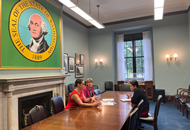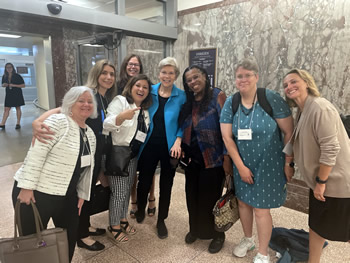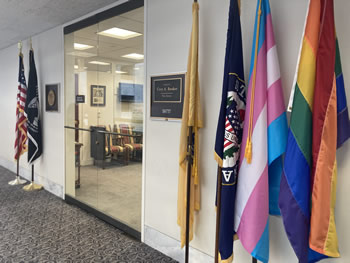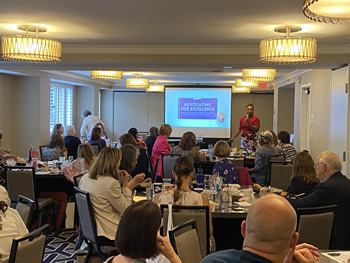|
 This June, more than 50 dedicated TESOLers took
their passion and voices to Capitol Hill to meet with their members of Congress
and advocate for the English language teaching (ELT) profession and the
multilingual learners of English (MLEs) they serve each and every day.
Presented with engaging sessions and the strength of networking, attendees of
TESOL’s 2023 Advocacy & Policy Summit brought to Congress not only
priorities within the federal budget and innovative legislation, but also the
stories and impact and promise of their campuses and communities. This June, more than 50 dedicated TESOLers took
their passion and voices to Capitol Hill to meet with their members of Congress
and advocate for the English language teaching (ELT) profession and the
multilingual learners of English (MLEs) they serve each and every day.
Presented with engaging sessions and the strength of networking, attendees of
TESOL’s 2023 Advocacy & Policy Summit brought to Congress not only
priorities within the federal budget and innovative legislation, but also the
stories and impact and promise of their campuses and communities.
Summit attendees gathered near Georgetown on the 20th of June and were
greeted with policy and advocacy updates from several of TESOL’s colleague
associations throughout the day. Proudly sponsored by the American Federation of
Teachers, the Summit began with a U.S. Federal Policy Update, covering
the backdrop of the 118th Congress and legislative
priorities for this year’s Hill visits. On this panel were Deborah
Kennedy, executive director for the National Coalition for Literacy, and
Roxanne Garza, deputy director of education policy at UnidosUS.

You never know who you will meet while in DC.
The U.S. Department of Education provided updates with highlighted
sessions from the Office of English Language Acquisition (OELA) and the Office
of Career, Technical, and Adult Education (OCTAE). Deputy secretary and
director of OELA Montserrat Garibay inspired attendees on the secretary of
education’s vision for MLEs through the Raise
the Bar for Multilingualism program, which included highlights on
important dates affecting public education and the numerous resources available
through OELA in support of educators, learners, and their families. OCTAE Management
and Program Analyst Domminck
McParland provided an overview of initiatives through the Adult
Education and Family Literacy Act, including important data on participants and
impact across the United States.
Prior to the heartfelt and inspirational keynote from Kia Johnson,
director of PreK–12 Language and Literacy at the Center for Applied
Linguistics, attendees heard from Roger Rosenthal, executive director of the
Migration Legal Action Program on the rights of immigrants and English learners
in public education. Attendees then chose between two separate sessions on
policy and advocacy for newcomers, one for pre-K–12 and the other for adult
education. These sessions were led by Margie McHugh, director of the National
Center on Immigrant Integration Policy at the Migration Policy Institute; Julie
Sugarman, senior policy analyst for PreK–12 Education at the Migration Policy
Institute; and Xinolin Cruz-Gonzalez, deputy director of Californians
Together.

New Jersey pride.
The afternoon ended with a question-and-answer session with three
staffers from the offices of Representatives Adriano Espaillat, Nikema
Williams, and Brian Fitzpatrick. During this session, the staffers had an
impromptu request to role-play a Hill Visit, and they handled it perfectly,
giving attendees, many of whom were on the Hill for the first time, a glimpse
into the expectations for presenting the issues to their members of Congress.
The evening ended with a reception, at which the Center for Applied Linguistics
raffled off two professional development opportunities.
The next day, TESOLers hit the Hill.
Representing more than 25 states and carrying issue briefs along with
data on their own programs and communities, attendees had more than 100 visits
at which they presented the issue or policy, framed the impact, told their
stories, and made their asks.
While most of the visits were with legislative staffers who work with
education policy, several attendees were able to meet directly with their
members of Congress, and sometimes these meetings were impromptu visits in the
halls of the congressional offices. At one such encounter, several TESOLers
found Senator Elizabeth Warren traversing the hall, and, in true TESOL fashion,
a party ensued as they all gathered around for pictures. Even when the member
was not one that an attendee may have supported, they followed the mantra that
education was indeed and truly is a bipartisan issue—regardless of which side
of the aisle a member may reside.

Keynote Kia Johnson energizing for advocacy.
Advocacy was on full display during the summit and continues each day.
As educators, advocacy is inherently ingrained in what we do—whether in the
classroom for the needs of a student well beyond any demands of the curriculum,
in the community for the rights and access of families, on our
own campuses to advance professionalism and scholarship, or, as evidenced at
TESOL’s 2023 Advocacy & Policy Summit, exercised in the direct
constitutional right of petitioning the government.
Continue in your advocacy today. TESOL has numerous resources
available at www.tesol.org/advocacy,
and you too can join in advocating for the federal priorities by taking action
today through TESOL’s Advocacy
Action Center.
If you have any questions on advocacy or would like additional
information on how TESOL can support advocacy where you are, please contact us
today at advocacy@tesol.org.
|